
Financially, the heat was off. Our home territory was divided into three business units. The largest was the Melbourne head office, responsible for companywide administration and the development, sales, and support of the new-generation UNITS® and EQUIP® suite of products.
The Sydney office housed the ex-Newmans team responsible for eastern states account management and the continued development, sales and support for PMDS®, their legacy DMS. And in NZ, our Wellington office, under the leadership of Roger Peffers, was a standalone business entity charged with selling and supporting all the company’s products and services in that country. Roger was also responsible for support and implementation of our Southeast Asian conquests.
The principal opposition, also based in Melbourne, had dominated the market in our region for two decades and was an aggressive competitor. As the saying goes, where does the alpha gorilla sleep in the jungle? Answer: anywhere he likes! And so it was. We needed a point of difference, and it came in the opportunity to enter the international Agricultural and Construction industry market on the back of the credibility afforded us by our deal with John Deere. This would lessen our exposure to adverse fluctuations in the automotive market.
Our arrangement with JDIS in the US was to train their sales and support teams so they could convert the John Deere dealers to our software which they’d rebranded “Equip.” Our part of the bargain was to provide technical support to JDIS and to keep the system compliant with the accounting and legal requirements of the USA and Canada. North America was now an important revenue generator, and we could turn our mind to opportunities in other offshore markets.
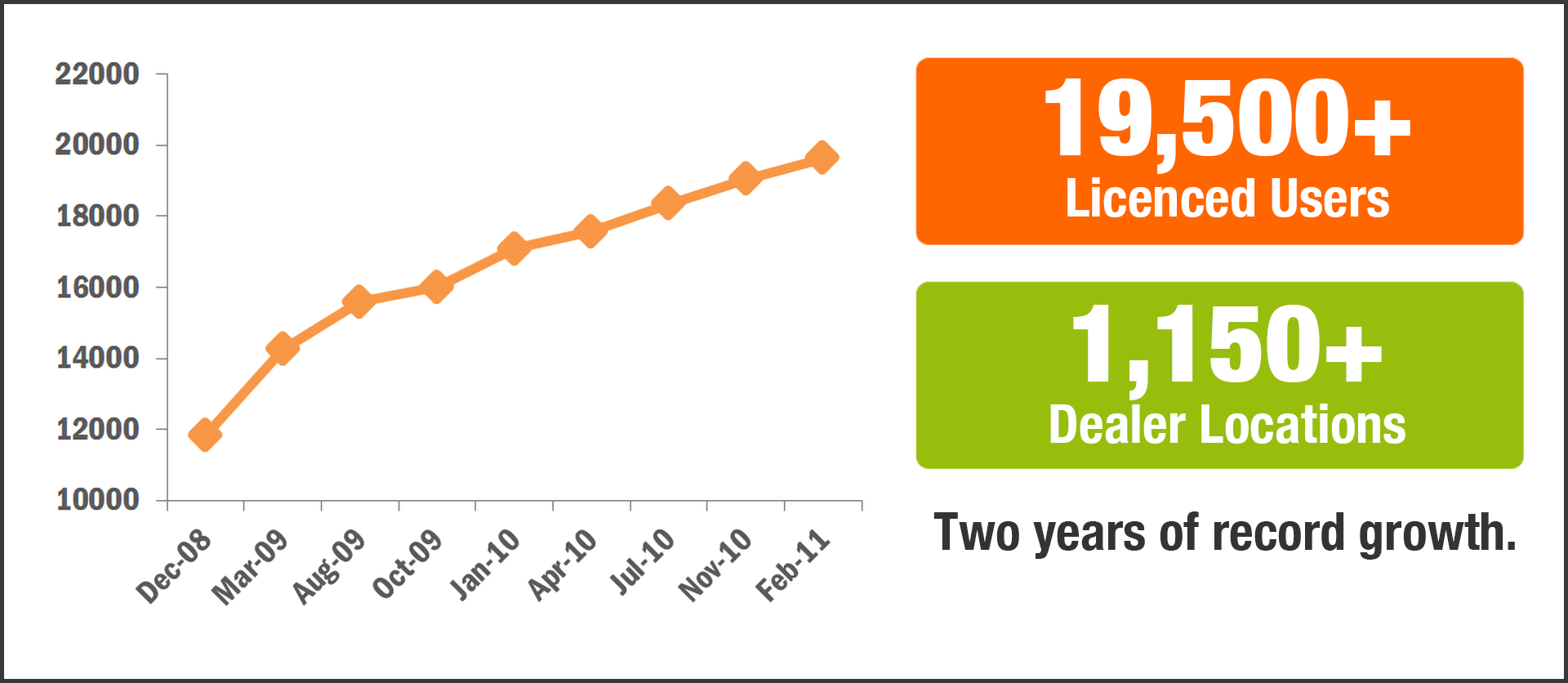
With our client base steadily growing in Australia, NZ, North America and Southeast Asia, we opened our fourth permanent office, this one in Kuala Lumpur Malaysia, and decided to try our hand in China.
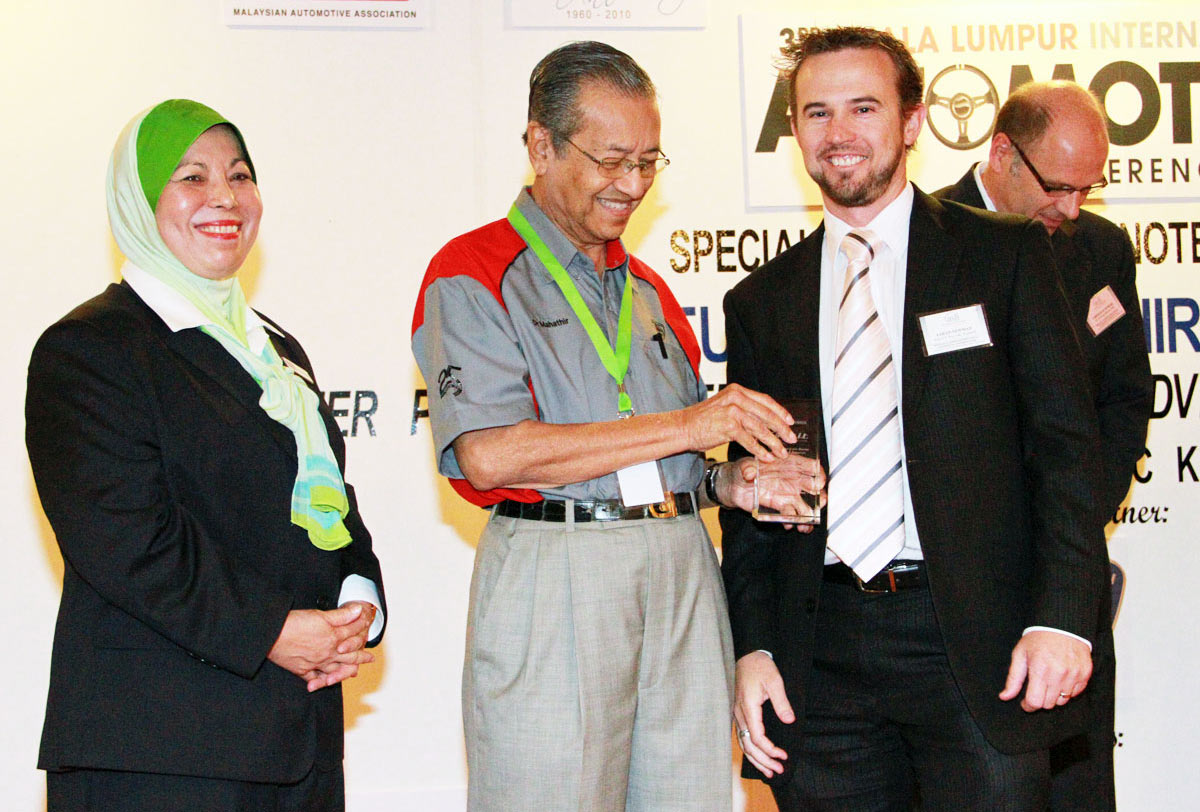
Dr Mahatir bin Mohamad, former Prime Minister of Malaysia, presenting an award to Auto-IT’s Sales and Marketing Director, Aaran Newman for recognition and sponsorship of KLIAC 2010.
China
There was a book published by Chin-Ning Chu in 1994 entitled “Thick Face, Black Heart. The Warrior Philosophy for Conquering the Challenges of Business and Life”. This book is still in print and is a must read for foreigners eying business opportunities in China.
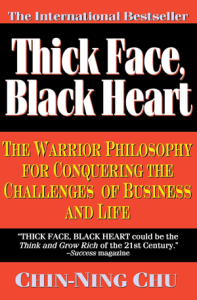 A thick face means to disguise your intentions by displaying only emotions that suits your objective. Black Heart is self-explanatory. The objective is to win, and to advance your interests, the interests of your family, and the interests of China. Not to make friends.
A thick face means to disguise your intentions by displaying only emotions that suits your objective. Black Heart is self-explanatory. The objective is to win, and to advance your interests, the interests of your family, and the interests of China. Not to make friends.
Westerners expect transparency in business dealings, with clearly written contracts, and in most cases, a level playing field. Chinese believe trust can only develop over time, and a handshake emanating from a trusted relationship is more reliable than a signature on a piece of paper.
When demonstrating our dealer Management systems, we would explain the necessity for structured accounting, and automatically generated exception reports. I’d noticed business owners frowning at this concept. On questioning they would agree on the need to keep a watchful eye on staff, but more importantly the system would need to produce two sets of results, one for the owner and one for the tax man.
One dealer principal told me any system he’d invest in would need to produce three sets of results. One for the tax man, one for the owner, and one for the owner’s wife. He smiled when he explained this, but I don’t believe he was joking.
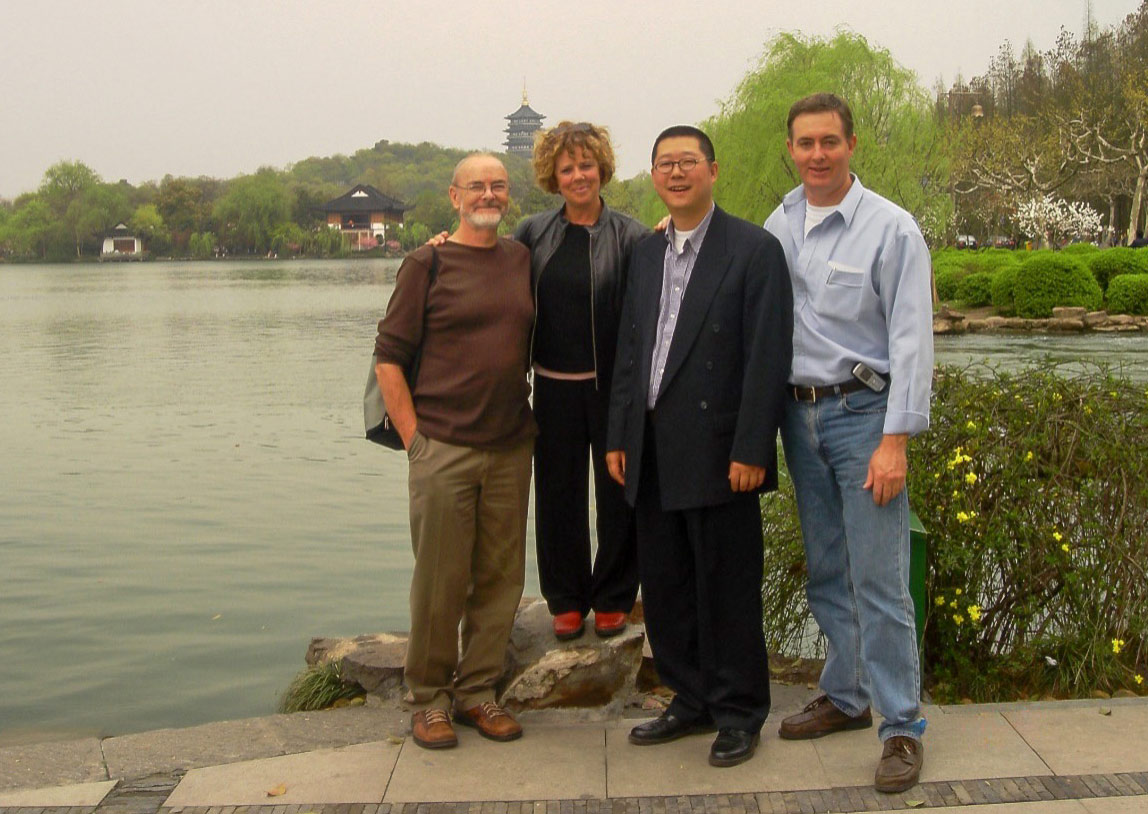
The China Team in 2005, from left: Me, Lee, Hu Wang, and Michael Cross.
I discovered an unassuming programmer Hu Wang from our development team, had grown up in Shanghai and was fluent in both Mandarin and Shanghainese. He turned out to be an excellent interpreter. Hu and I, together with Michael Cross, one of our senior sales guys, made several visits to China and had very little trouble obtaining qualified interviews with prospective clients.
The Chinese would be attentive, and our presentations flowed smoothly. We had encouraging meetings with the Shanghai Automotive Company, and also brokered a partnership with China Telecom. They would provide networking services to the companies we sold to, and we would collaborate in the sales process. In return they would share in profits from our software sales. The potential was enormous!
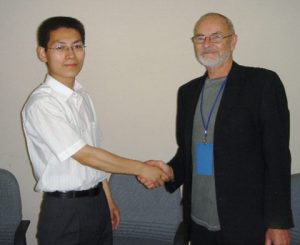 The signing ceremony with China Telecom duly took place and we returned to Melbourne reasonably satisfied. I wrote about our success in the Auto-IT company newsletter but was developing niggling doubts. I’d come to realise that in those early days everyone was trying to get a slice of the Chinese market, and the Chinese could pick and choose whoever they wanted to partner with.
The signing ceremony with China Telecom duly took place and we returned to Melbourne reasonably satisfied. I wrote about our success in the Auto-IT company newsletter but was developing niggling doubts. I’d come to realise that in those early days everyone was trying to get a slice of the Chinese market, and the Chinese could pick and choose whoever they wanted to partner with.
They preferred to do business with foreigners who were prepared to take the lion’s share of the risk, for a minor share of the profit. In the case of China Telecom, or the Shanghai Automotive Company, why would these huge corporations sign such unlikely agreements with a small company like Auto-IT? Answer: because we couldn’t possibly challenge them financially if it came to litigation. Their risk was non-existent, but the upside for them was the opportunity to hook into to a potential new income stream while at the same time gaining knowledge of new foreign technology.
We discussed our fears with a marketing expert in Australia and were correctly advised there were easier pickings in other domains.
India
Whilst in China we’d been invited to present UNITS® to the IBM sales team in Shanghai. The demonstration went well and piqued the interest of Tobin Alexander, a young sales executive charged with selling solutions into the Asian Automotive market. Tobin was a hard-working Texan who spoke Mandarin. There were synergies in our interests, and we were to team up with Tobin and IBM in several prospecting forays in the future. The first was in New Delhi.
Tobin visited us in Melbourne, where we collaborated on putting together a response to a Request for Proposal (RFP) for the supply of a DMS for Mahindra, one of the largest suppliers of commercial and passenger vehicles in India. Rohan Duncan, one of our UNITS®,experts, and I, duly organized our visas and set off for our first visit to India.
New Delhi was an exciting city 20 years ago. The poverty was confronting, and the culture shock very real at first. But the colour, and the energy of the city, plus the sophistication of some of the hotels, shops, and restaurants won me over. A city of insane contrasts, with the most expensive cars on the planet mingling on the crowded streets with tuk-tuks handcarts and bicycles, all brought to a stop by a Brahman cow with dreamy eyes, lying in the middle of the road chewing its cud. My mind flashed back 28 years, to the look in the eyes of the marauding Brahman bull during my time in Fiji, just before he smashed the tibia and fibula in my right leg.
The first surprise when we emerged from the airport after negotiating the scrum through customs, was security. This consisted of strategically placed sentry posts constructed of sandbags piled chest high and roofed to keep out the weather. These were manned by soldiers armed with 60 years out of date Lee Enfield 303 rifles, dressed in scruffy World War II British army uniforms.
This was 2005 and the taxi to our upmarket hotel, charged to us at IBMs mouth-wateringly discounted rates, was a Hindustan Ambassador. An exact copy of the British 1957 Morris Oxford III S. India continued to manufacture these self-same vehicles for a further 60 years after partition, until the last one rolled off the production line in 2014.

1957 Oxford IIIS re-licensed as a Hindustan Ambassador.
I made several trips back to India accompanied by either Rohan or Michael Cross, but circumstances did not work in our favour. The bid for the Mahindra business lasted four days. Our presentations went well enough and our strategy meetings with the IBM people proved to both parties that we could work together if we won the contract. But the weeks went by until Mahindra informed IBM they’d decided they would write their own system. I arrived home at around midnight from that trip feeling very uneasy. I’d travelled extensively over the years and was proud of my constitution, but this time I was beaten. By morning I had full-blown Delhi Belly and was violently sick and bedridden for three days.
A year later we’d learnt from our contacts at Ford Australia that Ford India were looking for a dealer management system to computerise their 145 dealerships. Many of these businesses were company owned, and our recommendation from Ford Australia gave us a significant advantage. Feedback was positive after we’d submitted our pricing, and we were told in confidence we were front runners. But in June 2007 the Global Financial Crisis (GFC) took hold and when it ended in 2009 the Ford Motor Company had downsized globally, and their distribution network development plans in India had been abandoned.
Nowadays Auto-IT has an office in south India which employees a small programming team, but the company has no Indian customers.
Yemen
The most enigmatic deal I’ve ever been involved with commenced with an international call from Yemen. The caller asked in good, slightly accented English, if I could quote him for the supply of a dealer management system to be used in a Mercedes-Benz dealership in Sanaa. He sounded genuine so I sent off a proposal for the supply of the software, together with implementation and support services, and associated travel and accommodation costs.
He rang me back saying they were computer literate and wouldn’t require training or implementation assistance. Dealer management software is sophisticated and tightly integrated. Training and support contracts are critically important. I called back to explain this and suggested that, as a compromise he could come to Australia for some one-on-one training. I heard no more, and a week or two later Lee and I were in Spain enjoying a much-needed holiday.
I will never forget the day we were sitting in the sun, on a beautiful beach, looking across the Mediterranean at the misty shores of Morocco in the distance. My cell phone rang, and I could see it was my Yemen prospect. He said, we’ve decided to go ahead with the purchase of your software, and we accept your price of $32,000 USD. What’s our next step? I said I’ll send our account details and when the funds are in our bank we’ll remit the software on CD-ROMS by return mail.
This was the mid-1990s and $32000 US was a considerable sum. I had zero confidence in the money arriving – but it did. We bundled up the software and manuals and shipped the package off to Yemen.
Frank rang to see if he could help them get started, but the answer was no, the system is installed and running satisfactorily. They had a few questions which he was able to help with, and after that we had very little contact. I often wonder if their dealership still stands in this Yemen war zone, and if its polite, clever, and trusting financial controller still survives.
Kuwait
We were approached by the Al Sayer Group’s Toyota dealership in Kuwait for a quote for the supply of our dealer management system. After preliminary discussions, Saleh Al Kout, the Group IT Manager, and Ghassan Kabbara, Information Systems Manager, decided to visit us in Australia.
During their time with us, we provided a deep dive into the system, including the mandatory requirement for left to right reading capability, and Arabic script. All went well and we decided the next step should be a visit by Auto-IT to Kuwait.
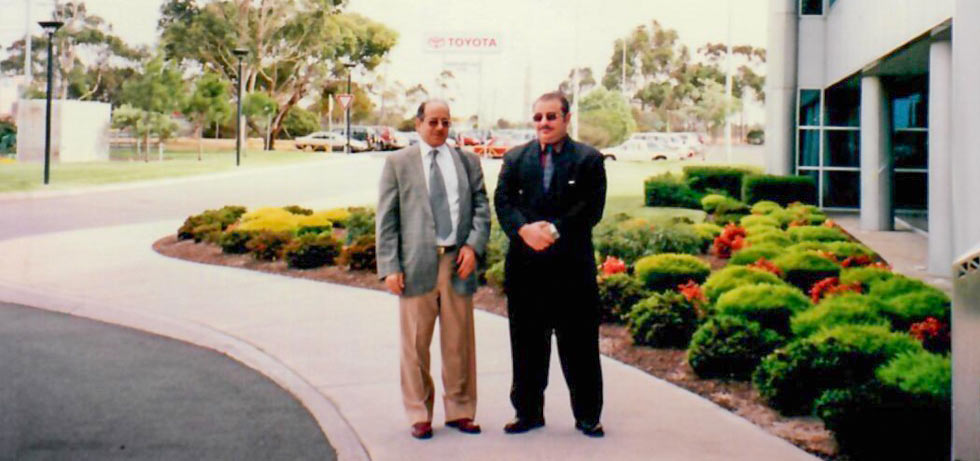
Saleh Al Kout and Ghassan Kabbara – Melbourne, 1999.
Michael Damianos accompanied me as we needed to gain a detailed understanding of their compliance requirements, given there is no income tax levied in Kuwait. In fact, the opposite applies. Kuwait is a Petro-State, and all its citizens receive an annual emolument as their share of profit from the state-owned oil industry.
We were to discover the Al Sayer dealership had a monopoly for Toyota vehicle sales in the region, which made them larger by a considerable margin than any Toyota dealership in Australia. And as for the dealership itself, it was opulent. Even the mechanics’ locker room and ablution facilities were gleamingly clean with marble benchtops and shiny fittings befitting a residential bathroom in any first-world country.
We were warned before we left that at this time of year temperatures rise to 50c plus, but there had been seasonal sandstorms that obscured the sun, and everything was coated in a fine layer of dust. This prevailed throughout our visit and in the Toyota dealership, keeping the vehicles clean on the forecourt would have been a nightmare.
Al Sayer had booked our accommodation at The Sheraton Kuwait – Luxury Hotel, and they arranged for us to be picked up from the airport by an Al Sayer driver. At check-in, instead of queuing at the front counter we were ushered to comfortable seating in a cool area and presented with moist towels and cups of tea served in ornate cups. We remained seated until we’d finished with the check-in forms. This was our first experience of traditional Arabic hospitality to travelers, we were impressed.
 Upstairs In our rooms there was a welcoming package which included an Al Sayer information tape and a note asking us to play it on the in-room consol before we met with the group principals at the dealership.
Upstairs In our rooms there was a welcoming package which included an Al Sayer information tape and a note asking us to play it on the in-room consol before we met with the group principals at the dealership.
The boardroom, not surprisingly, was ostentatious, and a perfect setting for our introduction to the company directors who filed in, dressed in traditional keffiyeh and dishdashi robes. There were polite introductions, light refreshments, and a run through of our itinerary for the next few days. We were informed our accommodation had been taken care of and we would also have the run of the hotel restaurants except for the one on the fourth floor. Our driver would pick us up each morning and we were re- introduced to our two primary contacts, Saleh and Ghassan (above).
The next few days were among the most interesting I’ve experienced in my years of travelling for Auto-IT. We were in sales mode in Kuwait and not expecting our accommodation to be taken care of. The only other country in my travels showing similar magnanimity, (in a slightly different way) was Russia. But that’s a story for another chapter.
One afternoon, while Michael and Ghassan were taking part in a scintillating conversation about debits, credits, and dead stock ratios with the financial controller, I spent a pleasant few hours conversing with Saleh. He was a little older than me, but we had an easy rapport. We covered many topics that afternoon including our families, the Muslim faith, and the Kuwaitis’ experiences during Sadam Hussein’s invasion in 1990.
Saleh and Ghassan visited us in Melbourne one more time but eventually Al Sayah made the decision to write their own dealer management software. We were disappointed, but in some ways not surprised, because the Al Sayer programming department employed roughly twice as many programmers as Auto-IT. Sadly, Saleh passed away a few years ago but Ghassan remains a close friend.
Chapter 7 – Europe, Russia, and The Americas
In chapter 7, I write about my sales journeys in Europe, Russia, and the Americas.
Ken Fife – August, 2024

It was an amazing time and a great experience travelling throughoutAsia together. I can recall one occassion when we were all in an elevator with some chinese locals who were talking among them selves. One of the locals apologised and said they were just discussing how you looked identical to Sean Connery.
Not a bad compliment!
Thank you Michael and thank you for reminding me of the embarrassing incident in the elevator.
Most interesting as always Ken . An amazing transition from Agriculture to big Business!
Thanks David
This has been a part of your development that I was unaware of. Very interesting and I look forward to the Russian adventure.
Thanks John. I’m looking forward to our next catch up. It’s been a while
Loved reading this – interesting times for you. Finding the photos documenting your aging fascinating. You went grey in the course of two paragraphs.
Hi Alison,. Sadly I had to shorten chapter 6, at the end of the next two paragraphs I had no hair at all!
As always interesting reading and impressive achievements .
Very interesting Ken, Den would have loved to have read these.
I look forward to Ch7